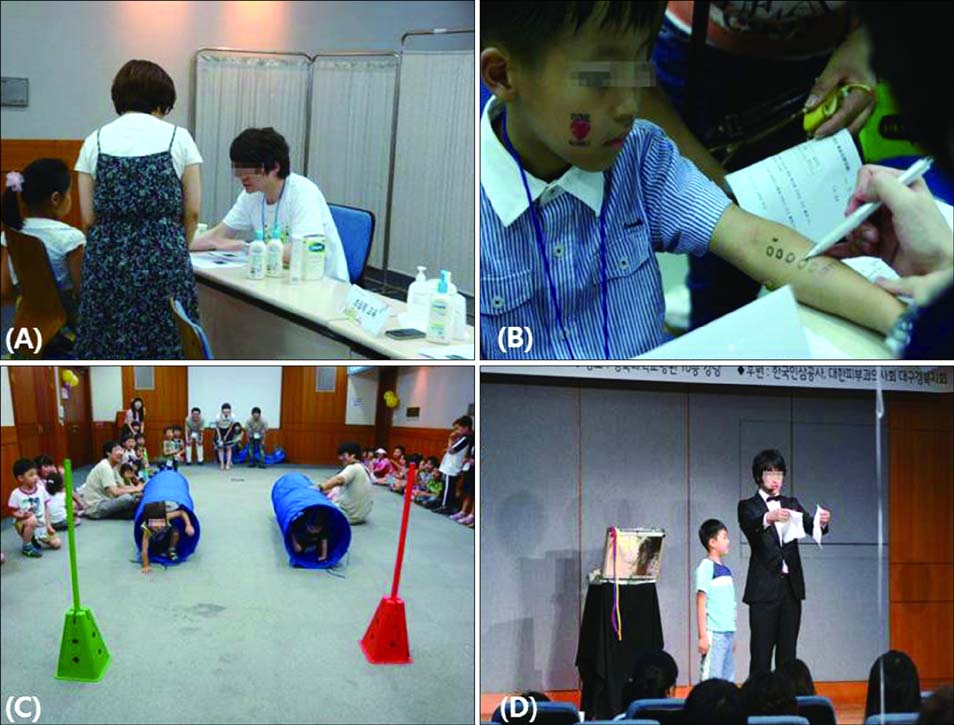Ann Dermatol.
2015 Aug;27(4):383-388. 10.5021/ad.2015.27.4.383.
A Family-Engaged Educational Program for Atopic Dermatitis: A Seven-Year, Multicenter Experience in Daegu-Gyeongbuk, South Korea
- Affiliations
-
- 1Department of Dermatology, Kyungpook National University School of Medicine, Daegu, Korea. kimdw@knu.ac.kr
- 2Department of Dermatology, Yeungnam University College of Medicine, Daegu, Korea.
- 3Department of Dermatology, Keimyung University School of Medicine, Daegu, Korea.
- 4Department of Dermatology, Catholic University of Daegu School of Medicine, Daegu, Korea.
- 5Department of Dermatology, Dongguk University College of Medicine, Gyeongju, Korea.
- KMID: 2171493
- DOI: http://doi.org/10.5021/ad.2015.27.4.383
Abstract
- BACKGROUND
It is important to educate families of pediatric patients with atopic dermatitis (AD) so that they have a correct understanding of AD.
OBJECTIVE
The purpose of this study is to introduce, evaluate, and improve our family-engaged educational program.
METHODS
Children suffering from AD and their families have participated in a half-day educational program called "AD school" with catchy slogans such as "Enjoy with AD Families!" every year since 2005. Educational lectures were conducted for parents. For children with AD, various entertaining programs were provided. A feedback survey about AD school was administered for the purpose of evaluation.
RESULTS
A total of 827 people (376 patients and 451 family members) participated in this program over 7 years. On-site surveys showed a positive response (i.e., "excellent" or "good") for the prick test (95.1%), emollient education (78.4%), educational lecture (97.0%), drawing contest and games (90.2%), and recreation (magic show; 99.0%) respectively. Telephone surveys one year later also elicited a positive response.
CONCLUSION
We herein introduce the experience of a half-day, family-engaged educational program for AD. Family-engaged education programs for AD such as this AD school encourage and validate family participation in the treatment of their children's AD.
Keyword
Figure
Cited by 1 articles
-
Current Status of Patient Education in the Management of Atopic Dermatitis in Korea
Min Kyung Lee, Ju-Hee Seo, Howard Chu, Hyunjung Kim, Yong Hyun Jang, Jae Won Jeong, Hye Yung Yum, Man Yong Han, Ho Joo Yoon, Sang-Heon Cho, Yeong Ho Rha, Jin-Tack Kim, Young Lip Park, Seong Jun Seo, Kwang Hoon Lee, Chang Ook Park
Yonsei Med J. 2019;60(7):694-699. doi: 10.3349/ymj.2019.60.7.694.
Reference
-
1. James WD, Berger TG, Elston DM. Andrews' disease of the skin: clinical dermatology. 11th ed. Philadelphia, PA: Saunders Elsevier;2011. p. 62–70.2. Boguniewicz M, Abramovits W, Paller A, Whitaker-Worth DL, Prendergast M, Cheng JW, et al. A multiple-domain framework of clinical, economic, and patient-reported outcomes for evaluating benefits of intervention in atopic dermatitis. J Drugs Dermatol. 2007; 6:416–423.3. Lambert J, Bostoen J, Geusens B, Bourgois J, Boone J, De Smedt D, et al. A novel multidisciplinary educational programme for patients with chronic skin diseases: Ghent pilot project and first results. Arch Dermatol Res. 2011; 303:57–63.
Article4. Wenninger K, Kehrt R, von Rüden U, Lehmann C, Binder C, Wahn U, et al. Structured parent education in the management of childhood atopic dermatitis: the Berlin model. Patient Educ Couns. 2000; 40:253–261.
Article5. Ricci G, Bendandi B, Aiazzi R, Patrizi A, Masi M. Three years of Italian experience of an educational program for parents of young children affected by atopic dermatitis: improving knowledge produces lower anxiety levels in parents of children with atopic dermatitis. Pediatr Dermatol. 2009; 26:1–5.
Article6. Grillo M, Gassner L, Marshman G, Dunn S, Hudson P. Pediatric atopic eczema: the impact of an educational intervention. Pediatr Dermatol. 2006; 23:428–436.
Article7. Shin JY, Kim do W, Park CW, Seo SJ, Park YL, Lee JR, et al. An educational program that contributes to improved patient and parental understanding of atopic dermatitis. Ann Dermatol. 2014; 26:66–72.
Article8. Kim NK, Lee DH, Seo HS, Sun SH, Oh YL, Kim JE, et al. Hwangryunhaedoktang in adult patients with atopic dermatitis: a randomised, double-blind, placebo-controlled, two-centre trial--study protocol. BMC Complement Altern Med. 2011; 11:68.


